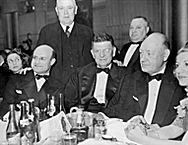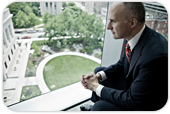| Clout | ||
In the mid-twentieth century, Chicago writers coined the term “clout” to mean political power and influence. This political usage probably was taken from the baseball expression “What a clout!” which described a powerful hit.
By the 1970s, the query “Who's your clout?”—questioning one's ability to reach and persuade those in power—had found wide national usage beyond its Chicago origins. | ||
Who's your clout?
Chicago: The Cost of Clout
An interesting article by Aaron Renn about Chicago. He contends that Chicago's lagging economy is due to clout. I think he is correct. Quotes:
"It described the sad reality of how Chicago’s economy is in the tank, and has been underperforming the nation for the last few years."
"The region also has lagged in innovation, firm creation and growth in productivity and gross metropolitan product over the past decade, according to economic development consultant Robert Weissbourd, president of RW Ventures LLC. "
"Believe it or not, a lot of it goes back to that bane of Chicago politics: Clout. People in Chicago tend to write off clout and political corruption in Chicago with a shrug, as a unique or even amusing local affectation, or just part of the character of purely political life of the city, but one that doesn’t fundamentally change its status as the “City That Works.” But nothing could be further from the truth. Chicago’s culture of clout is a key, perhaps the key, factor holding the city back economically."
Read the article at:
http://www.urbanophile.com/2011/01/16/chicago-the-cost-of-clout/
http://www.urbanophile.com/
Ubi Est Mea -- Where's mine?
Ubi Est Mea -- Where's mine?
Tthe late great Chicago newspaperman, Mike Royko, gave the "Windy City" its unofficial motto: "Ubi Est Mea -- Where's mine?", meaning where is my share of the boodle. A sometimes heard alternative is, "What's in it for me?
Chinaman was an epithet for political mentors and backers in the politics of Chicago, Illinois, U.S., in the 1900s. Although politically incorrect, the term is still in use today. An example of the use of the term appeared in the January 27, 2004 Chicago Sun-Times: "Before the age of political correctness, Munoz would have been called Torres' chinaman, and in City Hall, that's still what they'd call him, but if you prefer, you can stick with mentor or patron."
Joe Peyronnin: "Ubi Est Mea -- Where's Mine?" - Huffington Post
Dec 9, 2008 – That's why the late great Chicago newspaperman, MikeRoyko, gave the "Windy City" its official motto: "Ubi Est Mea -- Where's mine?" ...One More Time: The Best of Mike Royko - Page 19 - Google Books Result
books.google.com/books?isbn=0226730727Mike Royko - 2000 - Literary CollectionsThe Best of Mike Royko Mike Royko. October 27, 1967 ... The new motto — Ubi Est Mea — means "Where's Mine?" The phrase "Where's Mine?" can be heard ...The Evolution of Rod Blagojevich's Favorite Phrase | Mental Floss
Jan 15, 2009 – Back in 1967, tough-talking Chicago journalist Mike Roykoconcocted a ... for the City of Strong Shoulders—"Ubi Est Mea," or: "Where's mine?Royko: A Life in Print - Page 136 - Google Books Result
books.google.com/books?isbn=0786751975F. Richard Ciccone - 2009 - Biography & Autobiography"The new motto— -'Ubi Est Mea' —means "Where's Mine?'" Royko's first collections of columns, "Up Against It, " was published in 1967 by Henry Regnery ...Results for similar searches
List of Chicago Mayors
The mayoral term in Chicago was one year from 1837 through 1863, when it was increased to two years. In 1907 it was again lengthened to four years, the present duration. Until 1861, municipal elections were held in March. In that year, legislation changed them to April. In 1869, however, election time was changed to November, and terms expiring in April of that year were lengthened. In 1875, the election day was moved back to April by the city's vote to operate under the Cities and Villages Act of 1872.
| # | Name | Term | Party | Notes |
|---|---|---|---|---|
| 1 | William Butler Ogden | 1837–1838 | Democratic | |
| 2 | Buckner Stith Morris | 1838–1839 | Whig | |
| 3 | Benjamin Wright Raymond | 1839–1840 | Whig | |
| 4 | Alexander Loyd | 1840–1841 | Democratic | |
| 5 | Francis Cornwall Sherman | 1841–1842 | Democratic | |
| 6 | Benjamin Wright Raymond (2nd) | 1842–1843 | Whig | |
| 7 | Augustus Garrett | 1843–1844 | Democratic | |
| 8 | Alson Sherman | 1844–1845 | Independent Democrat | |
| 9 | Augustus Garrett (2nd) | 1845–1846 | Democratic | |
| 10 | John Putnam Chapin | 1846–1847 | Whig | |
| 11 | James Curtiss | 1847–1848 | Democratic | |
| 12 | James Hutchinson Woodworth | 1848–1850 | Independent Democrat | |
| 13 | James Curtiss (2nd) | 1850–1851 | Democratic | |
| 14 | Walter S. Gurnee | 1851–1853 | Democratic | |
| 15 | Charles McNeill Gray | 1853–1854 | Democratic | |
| 16 | Isaac Lawrence Milliken | 1854–1855 | Democratic | |
| 17 | Levi Day Boone | 1855–1856 | American Party | |
| 18 | Thomas Dyer | 1856–1857 | Democratic | |
| 19 | John Wentworth | 1857–1858 | Republican | |
| 20 | John Charles Haines | 1858–1860 | Democratic | |
| 21 | John Wentworth (2nd) | 1860–1861 | Republican | |
| 22 | Julian Sidney Rumsey | 1861–1862 | Republican | |
| 23 | Francis Cornwall Sherman | 1862–1865 | Democratic | |
| 24 | John Blake Rice | 1865–1869 | Republican | |
| 25 | Roswell B. Mason | 1869–1871 | Citizens | Mayor during the Great Chicago Fire of 1871. |
| 26 | Joseph Medill | 1871–1873 | Fireproof | Born in Canada |
| 27 | Harvey Doolittle Colvin | 1873–1875 | People's | |
| 28 | Monroe Heath | 1876–1879 | Republican | |
| 29 | Carter Harrison, Sr. | 1879–1887 | Democratic | father of Carter Harrison, Jr. |
| 30 | John A. Roche | 1887–1889 | Republican | |
| 31 | DeWitt Clinton Cregier | 1889–1891 | Democratic | |
| 32 | Hempstead Washburne | 1891–1893 | Republican | |
| 33 | Carter Harrison, Sr. (2nd) | 1893 | Democratic | Assassinated in office; father of Carter Harrison, Jr. |
| 34 | George Bell Swift | 1893 | Republican | Mayor Pro Tem |
| 35 | John Patrick Hopkins | 1893–1895 | Democratic | |
| 36 | George Bell Swift (2nd) | 1895–1897 | Republican | |
| 37 | Carter Harrison, Jr. | 1897–1905 | Democratic | First Chicago born mayor; son of Mayor Carter Harrison, Sr. |
| 38 | Edward Fitzsimmons Dunne | 1905–1907 | Democratic | |
| 39 | Fred A. Busse | 1907–1911 | Republican | |
| 40 | Carter Harrison, Jr. (2nd) | 1911–1915 | Democratic | |
| 41 | William Hale Thompson | 1915–1923 | Republican | |
| 42 | William Emmett Dever | 1923–1927 | Democratic | |
| 43 | William Hale Thompson(2nd) | 1927–1931 | Republican | |
| 44 | Anton Cermak | 1931–1933 | Democratic | Assassinated in office; second foreign born (in Kladno, Austria-Hungary) |
| 45 | Frank J. Corr | 1933 | Democratic | 32 days, Acting Mayor |
| 46 | Edward Joseph Kelly | 1933–1947 | Democratic | Act of the Illinois legislature permitted City Council to elect a non-alderman to fill the vacancy. |
| 47 | Martin H. Kennelly | 1947–1955 | Democratic | |
| 48 | Richard J. Daley | 1955–1976 | Democratic | Died in office; father of Richard M. Daley |
| 49 | Michael Anthony Bilandic | 1976–1979 | Democratic | |
| 50 | Jane Margaret Byrne | 1979–1983 | Democratic | First female mayor |
| 51 | Harold Washington | 1983–1987 | Democratic | Died in office; first Black/African-American mayor |
| 52 | David Duvall Orr | 1987 | Democratic | 8 days, Interim Mayor |
| 53 | Eugene Sawyer | 1987–1989 | Democratic | Elected by city council to complete Mayor Washington's term |
| 54 | Richard M. Daley | 1989–2011 | Democratic | Longest serving mayor; son of Richard J. Daley |
| 55 | Rahm Emanuel | 2011–present | Nonpartisan1 | First Jewish mayor |
Bathhouse John Coughlin 1893-1938
"Bathhouse" John Coughlin (August 15, 1860 – November
11, 1938) was an alderman of Chicago's First Ward from 1893 until his death. Coughlin acquired his nickname as a result of working in a bathhouse as a masseur. Eventually he was able to purchase a tavern and several bathhouses of his own. Coughlin and his partner, fellow First Ward alderman Michael "Hinky Dink" Kenna, were known as the "Lords of the Levee", a district which was part of their ward. The "Levee" was known as being a vice-ridden section of Chicago and home to many saloons, gambling dens, prostitutes, pimps, and flop houses. The two also led the Gray Wolves of Chicago.
Coughlin and Kenna were also the hosts of the First Ward Ball, an annual political fundraiser which brought together safecrackers, prostitutes, gangsters, politicians, businessmen, gamblers, and a variety of other types. The event raised more than $50,000 a year for the two First Ward aldermen until it was closed down in 1909 by Mayor Fred Busse. By the time it was banned, the ball was so large that it had to be held in theChicago Coliseum, the city's major convention center. Besides its notoriety in attracting many unsavory characters it often ended with the police having to curb disorderly conduct bordering on rioting.
Later when Coughlin was accused of corruption, he demanded a retraction, not for the charge of graft, but for the claim he was born in Waukegan,Illinois.
11, 1938) was an alderman of Chicago's First Ward from 1893 until his death. Coughlin acquired his nickname as a result of working in a bathhouse as a masseur. Eventually he was able to purchase a tavern and several bathhouses of his own. Coughlin and his partner, fellow First Ward alderman Michael "Hinky Dink" Kenna, were known as the "Lords of the Levee", a district which was part of their ward. The "Levee" was known as being a vice-ridden section of Chicago and home to many saloons, gambling dens, prostitutes, pimps, and flop houses. The two also led the Gray Wolves of Chicago.
Coughlin and Kenna were also the hosts of the First Ward Ball, an annual political fundraiser which brought together safecrackers, prostitutes, gangsters, politicians, businessmen, gamblers, and a variety of other types. The event raised more than $50,000 a year for the two First Ward aldermen until it was closed down in 1909 by Mayor Fred Busse. By the time it was banned, the ball was so large that it had to be held in theChicago Coliseum, the city's major convention center. Besides its notoriety in attracting many unsavory characters it often ended with the police having to curb disorderly conduct bordering on rioting.
Later when Coughlin was accused of corruption, he demanded a retraction, not for the charge of graft, but for the claim he was born in Waukegan,Illinois.
Images for bathhouse john coughlin
- Report images- More videos for bathhouse john coughlin »
Hinky Dink And Bathhouse John`s `Carnival Of Evil` - Chicago Tribune
Jan 25, 1987 – Hinky Dink And Bathhouse John`s `Carnival Of Evil` ... two aldermen), Michael ``Hinky Dink`` Kenna and John ``Bathhouse John`` Coughlin.
Subscribe to:
Comments (Atom)


